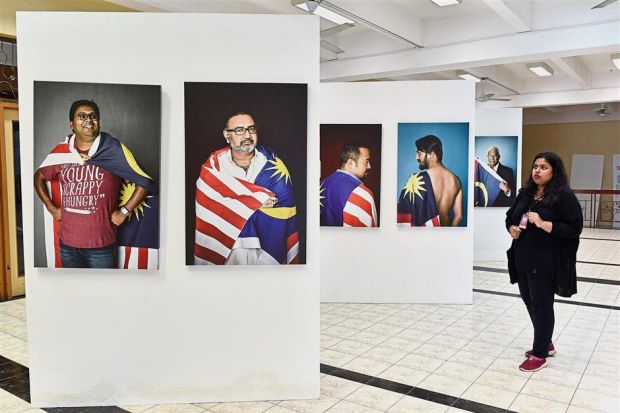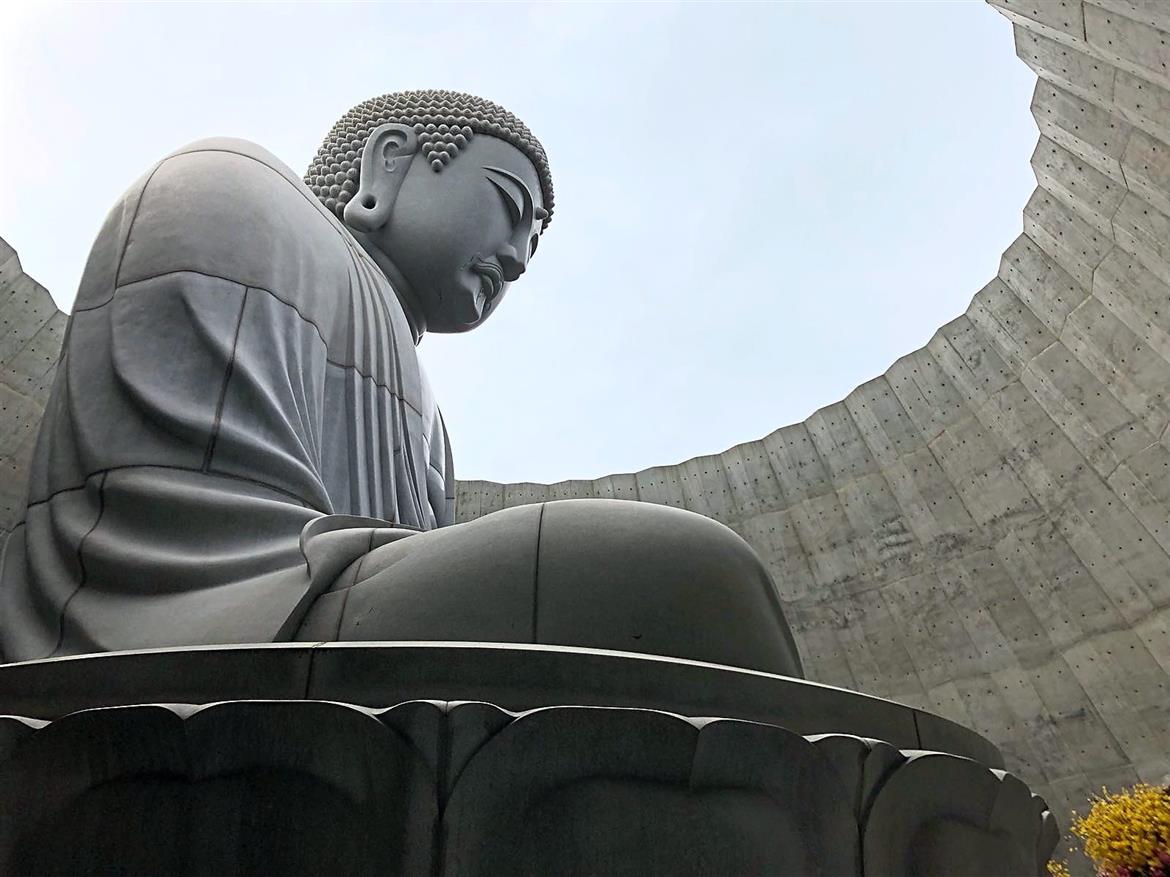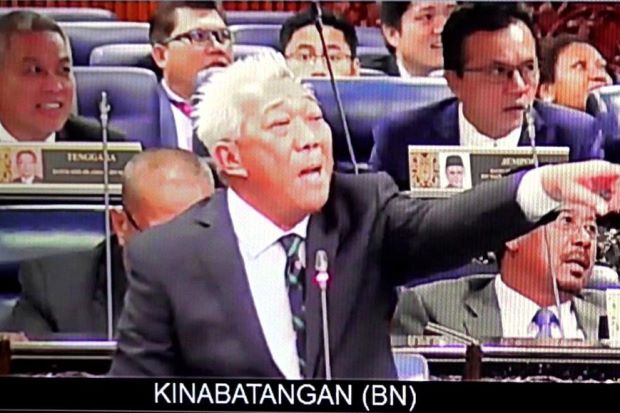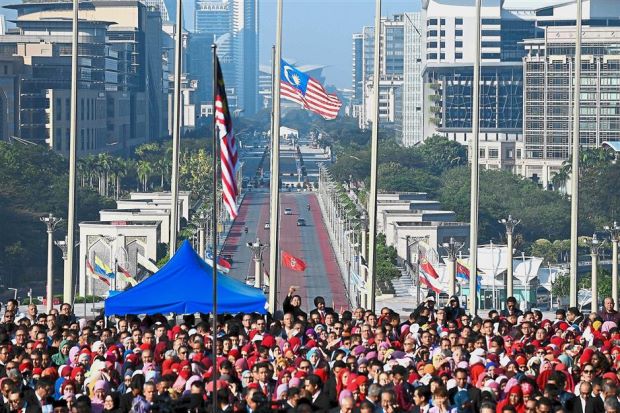
Taboo subject: The Merdeka exhibition, Stripes and Strokes , that is causing some Malaysians sleepless nights over photographs of LGBT activists.
IT’S a subject most Malaysians, and that includes prominent civil rights advocates, shy away from – the lesbian, gay, bisexual and transgender (LGBT) conundrum is regarded too controversial, taboo even.
So, many of us prefer not to talk about it, choosing to pretend that the LGBT community doesn’t exist. Or we simply don’t want to think about it. After all, why question seemingly conventional mindset?
Those who want to share their thoughts about it (often loudly) see it from a religious and even political viewpoint.
In their hyperbole, these people see the LGBT community as a threatening group with a deviant culture that “can destroy the moral fabric of society.”
Strangely, these moral police don’t even express anger and hatred towards terrorists and paedophiles.
At a time when Malaysians are dealing with more pressing concerns, like learning billions of ringgit have been stolen from us, consequently putting us under a mountain of debt, some of us are unbelievably having sleepless nights over photographs of LGBT activists at a Merdeka exhibition. Equally pertinent, apparently, is the community’s choice of washrooms – male or female. Go figure.
Over the past few weeks, the LGBT issue seems to have fired up many, with Minister in the Prime Minister’s Department Datuk Dr Mujahid Yusuf ordering the removal of two portraits of LGBT activists at an exhibition included in the George Town Festival.
Most Penangites likely never knew of the exhibition until the order to remove the photographs of Nisha Ayub and Pang Khee Teik was revealed.
Dr Mujahid was quoted as saying that he had no issues with people choosing to practise LGBT activities, so long as they abstained from openly promoting their lifestyle.
The angry exhibition sponsor, Datuk Vinod Sekhar, retorted that it was “incredible” that Dr Mujahid voiced his opinion, saying that discrimination against such people needed to stop.
“For the first time in Malaysia, a Minister has stood up and accepted that there is transgender victimisation. Prior to this, no Federal Minister in charge of religious affairs has come out and said this. This really changes the narrative of things in the new Malaysia,” Vinod was quoted.
The colourful businessman, a heart patient, got so upset and bothered that during an interview with a reporter fromThe Star, he collapsed when his defibrillator (implanted in his chest), failed.
A defibrillator is a device that releases a high energy electric shock to the heart through the wall of the chest of a person who goes into cardiac arrest.
Predictably, no one spoke up against Dr Mujahid’s directive after that, as far as I can recall. It can’t be denied that Dr Mujahid acted because it would have been politically suicidal of him to not have done so. The plain truth is that he wasn’t worried about LGBT activists – he was more concerned about the political fallout had he not acted.
Surely he is aware that there is still a political market for those who want to hear hate speeches on race and religion. The urban voters may want a New Malaysia, but at least 50% of the electorate, many in the rural constituencies, want the old ways to remain, evident from the popular votes tally in the recent general election.
Never mind that their own community stole from them, the appointment of key government posts to non-Malays is still abhorrent and a challenge to the position of Malays.
What more when issues relating to LGBT are impossible to defend in an increasingly religious Malaysia, and one involving a tiny fraction of Malaysians with no political clout or dividends to politicians.
So, when a transgender was beaten to a pulp by a group comprising eight men in Sungai Ujong, Negri Sembilan, it didn’t warrant national outcry.
In fact, most media didn’t even report it, and the indifference to this blatant and cowardly display of brutality and gangsterism seems to suggest that the cross-dresser deserved to be assaulted.
So goes the adage padan muka (serves you right), and surely this is expected when some of us berate and demonise this community.
It is one thing to tell your followers that such sexual orientations are against religious, and even cultural practices, but it is another thing all together to incite hatred against fellow human beings, where the line is crossed when a person is beaten up, and we look the other way, and worse, feel no remorse.
Apparently, CCTV images showed a group of men whacking the transgender in the middle of the street with a piece of wood and plastic pipe.
No one attempted to stop the assailants as the shocking violence played out, resulting in the victim suffering a ruptured spleen, several broken ribs as well as injuries to her back and head, which required 12 stitches.
It’s unequivocal – violence is wrong, and Deputy Women, Family and Community Development Minister Hannah Yeoh and her party colleague, lawyer Syahredzan Johan, must be commended for speaking out when most politicians chose not to.
“The hate speeches directed at the transgender community reduced their humanity in the eyes of society and has made it easier for them to be targeted. We condemn in the strongest terms any hate speech directed at the community,” said the duo in a statement.
“The men surrounded her, and it is believed that she was attacked because of prejudice against her gender identity and the fact that she is a transgender woman.”
Five individuals have been charged, three of whom are expecting to sit for the SPM examination in November. It’s frightening that prejudice has rooted itself in our younger generation. What business do they have spreading hate and inflicting pain on those different from them?
No more talk, the time to nip it in the bud is now, so we must send a strong message that violence, in any shape or form, can never be tolerated.
We already live in a highly prejudiced society, so, do we really need this kind of blatant brutality and lack of acceptance? Absolutely not!










